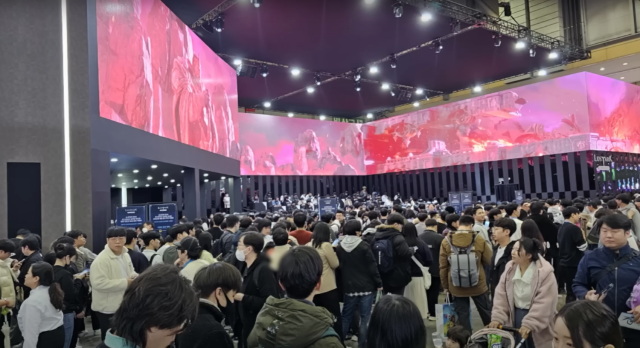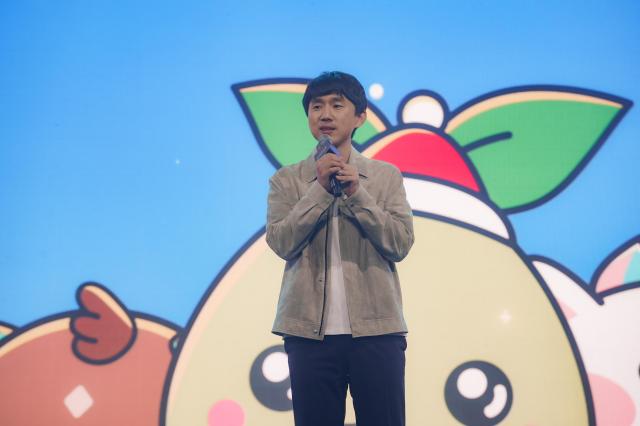
The excitement reached its peak when Keum Kang-sun appeared in the northern section of the convention site that was showcasing the mobile version of “Lost Ark,” a highly acclaimed PC-based MMORPG (massively multiplayer online role-playing game).
"I didn’t expect to see the legend himself,” said Kwon Min-gu, a 27-year-old IT professional, reflecting on his experience at the premier gaming industry convention in Busan last November.
Kwon was among those who waited in line for over an hour to take a photo with Keum. “As I did, they all cherished the moment.”
Keum, affectionately known by his nickname “Gold D. River,” is the division director for Lost Ark at Smilegate RPG. The slim, reserved-looking man is renowned for his active engagement with users, which has made him as much a star as his game.
Unlike other gaming industry directors and producers, Keum regularly participates in live talks with players, provides immediate feedback, and even addresses bugs or critical faults during live streams.
Despite being a relative newcomer, Lost Ark continues to dominate the Korean MMORPG market, according to gaming news portal GameMeca. Keum’s interactive and transparent involvement is credited as a key factor in the game’s success.

Kim Yong-ha, executive producer of “Blue Archive” at Nexon Games, also embodies active communication with fans. Known as the “successful otaku,” Kim has become the face of Blue Archive, released in October 2021.
Previously working on mobile games such as "Qurare: Magic Library at Smilegate Holdings," Kim earned a somewhat infamous reputation for allegedly mismanaging the game as its PD. Coincidentally, the game shut down the day after Kim took a leave of absence on March 22, 2018.
After joining Nat Games Inc. (which later became a Nexon subsidiary, Nexon Games) later that year as the executive producer of MX Studio, the subculture enthusiast began making prominent appearances in Blue Archive-related announcements and news. He even featured in a Samsung Galaxy S24 collaboration advertisement on March 7, 2024, with the set adorned with Blue Archive merchandise.

The game has garnered two awards at the 2022 Korea Game Awards and achieved remarkable commercial success, with total sales surpassing 690 billion won as of February. It is particularly successful in Japan, which accounts for 74 percent of the game’s total profits.
Kim has managed player communication through apology letters and announcement videos.
"I believe the Blue Archive IP is not simply delivered by development and operations but is an ecosystem created with the teachers (players' nickname)," Kim said in a Blue Archive blog post in May. "Thus, it's crucial to consistently express gratitude and create opportunities to build a connection.”

At its peak in January 2021, NCsoft registered its highly anticipated sequel, Blade & Soul 2, on February 9. Kim personally appeared in an official online showcase video promoting the game. Despite over 7.46 million registrations, stock prices plummeted by 11 percent just a day after the game’s launch on August 26, 2021. A blog review criticized the game for its excessive in-game purchases, saying, “It was a variation of their Lineage series, still a pay-to-win game.”
Even with the failure of another game, Trickster M, released in the second quarter of 2021, and Throne and Liberty, released on December 7, 2023, NCsoft’s lack of direct communication with users has been notable. Increasing complaints about “random boxes” (in-game purchases with real money) have led to National Assembly audits in 2018 and 2021, which included NCsoft.
During the audit on October 29, 2018, Kim Taek-jin denied faults, claiming, “Lineage M does not induce gambling tendencies.” He reportedly evaded the 2021 audit, citing a business trip as an excuse. Kim Taek-jin did not attend the general shareholders' meeting on March 28, 2024, citing a business trip to the U.S.

Professor Im Chung-jae from Keimyung University's Department of Game Software explains that games are a form of media Korea is still coming to terms with. "Games are like movies, both works of art, although the gaming industry is even larger in market size. Similarly, game developers should be regarded the same as movie directors, yet few are known publicly," Professor Im noted.
The Korean gaming market generated a total of 19.7 trillion won in 2023, according to the Korea Creative Content Agency, while a report released by the Korean Film Council states that the movie industry only made 1.6 trillion won in the same year.
"We need more game developers and critics communicating with people to foster better quality games," Professor Im added. "The number of players doesn't always indicate a game's perfection, just as audience numbers don't always reflect a movie's quality. A deeper insight into why one made a game or what they expect from it is necessary for a thriving game industry."
Copyright ⓒ Aju Press All rights reserved.




